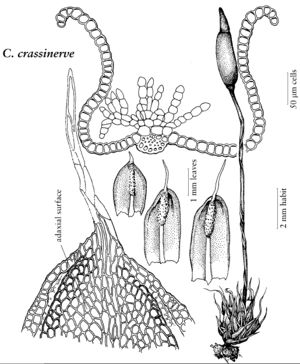Crossidium crassinervium var. crassinervium
Plants 1–5 mm. Leaves lanceolate, lingulate to lingulate-ovate, 0.5–1.3 mm, margins recurved to revolute from near apex to near base, apex obtuse, rounded or emarginate, piliferous; costa excurrent, with an abaxial epidermis, filaments 2–12 cells, cells cylindric, thin-walled, with 2–4 hollow papillae on apical cell, terminal cell cylindric or conic; cells of leaf base 7–58 µm, medial and distal cells 7–22 µm, smooth. Sexual condition dioicous or cladautoicous. Seta 6–13 mm. Capsule urn ovoid-cylindric, 0.9–2.2 mm; operculum 0.6–1 mm; peristome strongly twisted, 400–900 µm. Spores spheric, nearly smooth to conspicuously papillose, 9–15 µm.
Phenology: Capsule mature Dec–Jul.
Habitat: Soil and rocks, on banks and dry washes, under shrubs in desert areas
Elevation: moderate to high elevations (500-1700 m)
Distribution
Ariz., N.Mex., Tex., Utah, Mexico, Europe, Asia (China, India), n Africa, Atlantic Islands (Canary Islands).
Discussion
Crossidium crassinervium is characterized by the smooth-walled leaf cells and long, thin-walled filaments with cylindric to conic terminal cells. Papillae are present on the apex of the terminal cell and, occasionally, on the distal leaf cells.
Selected References
None.
